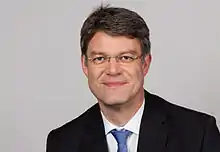Patrick Schnieder
Patrick Schnieder (born 1 May 1968) is a German lawyer and politician of the Christian Democratic Union (CDU) who has been serving as a member of the Bundestag from the state of Rhineland-Palatinate since 2009.
Patrick Schnieder | |
|---|---|
 Patrick Schnieder in 2014 | |
| Member of the Bundestag | |
| Assumed office 2009 | |
| Personal details | |
| Born | 1 May 1968 Kyllburg, West Germany (now Germany) |
| Political party | CDU |
| Alma mater | University of Bonn |
Political career
Career in state politics
From 2011 until 2018, Schnieder served as Secretary General of the CDU in Rhineland-Palatinate, under the leadership of chairwoman Julia Klöckner. During his time in office, he managed the party's campaign for the 2016 state elections.
Member of the German Parliament, 2009–present
Schnieder first became a member of the Bundestag after the 2009 German federal election.[1] He is a member of the Committee on Verification of Credentials and Immunities and the Committee on Transport and Digital Infrastructure.[2][3]
In addition to his committee assignments, Schnieder has been chairing the German Parliamentary Friendship Group with Belgium and Luxembourg since 2014. He is also part of the German-Italian Parliamentary Friendship Group and the German-Japanese Parliamentary Friendship Group. Since 2019, he has been a member of the German delegation to the Franco-German Parliamentary Assembly.
Within the CDU/CSU parliamentary group, Schnieder has been leading the group of CDU parliamentarians from Rhineland-Palatinate since the 2017 elections.[4] In the negotiations to form a coalition government under the leadership of Chancellor Angela Merkel following the elections, he was part of the working group on transport and infrastructure, led by Michael Kretschmer, Alexander Dobrindt and Sören Bartol.
Other activities
- Federal Network Agency for Electricity, Gas, Telecommunications, Post and Railway (BNetzA), Alternate Member of the Advisory Board (since 2014)
- German Red Cross (DRK), Member
- Association of German Foundations, Member of the Parliamentary Advisory Board (2009-2017)
Political positions
In June 2017, Schnieder voted against Germany’s introduction of same-sex marriage.[5]
In 2019, Schnieder joined 14 members of his parliamentary group who, in an open letter, called for the party to rally around Angela Merkel and party chairwoman Annegret Kramp-Karrenbauer amid criticism voiced by conservatives Friedrich Merz and Roland Koch.[6]
References
- "Patrick Schnieder". CDU/CSU-Fraktion. Retrieved 22 March 2020.
- "German Bundestag - Scrutiny of Elections, Immunity and the Rules of Procedure". German Bundestag. Retrieved 22 March 2020.
- "German Bundestag - Transport and Digital Infrastructure". German Bundestag. Retrieved 22 March 2020.
- CDU-Bundestagsfraktion: Patrick Schnieder (CDU) als Chef der RLP-Landesgruppe wiedergewählt Südwestrundfunk, 28 September 2021.
- Diese Unionsabgeordneten stimmten für die Ehe für alle Die Welt, June 30, 2017.
- Jens Schneider (October 30, 2019), Machtkampf in der CDU: Abgeordnete nennen parteiinterne Kritik "extrem schädlich" Süddeutsche Zeitung.
External links
- Official website (in German)
- Bundestag biography (in English)